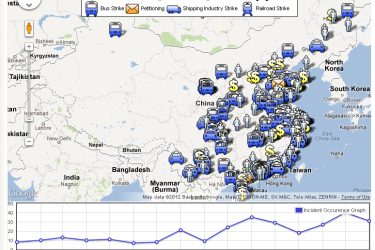China
China's 'bureaucratic capitalism'

Photo: Alex Mahan/Flickr.
Washington in Africa, 2012: Who will Obama ‘whack’ next?

Graphic from the Economist.
By Patrick Bond
[Address to the Muslim Youth Movement 40th Anniversary Conference, University of KwaZulu-Natal, Durban, September 30, 2012. Posted at Links International Journal of Socialist Renewal with the author's permission.]
At a time when popular revolutions are sweeping the globe, the United States should be strengthening, not weakening, basic rules of law and principles of justice enumerated in the Universal Declaration of Human Rights. But instead of making the world safer, America’s violation of international human rights abets our enemies and alienates our friends. – Former US president Jimmy Carter, 25 June 2012, New York Times
China, Apple and the labour process

Hong Kong photo essay: 180,000 rally to mark Tiananmen massacre anniversary

June 4, 2012 – Green Left Weekly – This photo essay by
Philippines: Progressive organisations express concern over ‘Southeast Asian Sea’ tensions
[For background to the Spratly Islands issue, see "China, Vietnam and the islands dispute: What is behind the rise of Chinese nationalism?"]
United Voices of Concern (amidst the sounds of fury over the Southeast Asian Sea)
World Peace Bell, Quezon Memorial Circle, Quezon City, Philippines
May 25, 2012 -- The contending states claiming territorial jurisdiction over sections of the "Southeast Asian Sea" [Spratly Islands] are only heightening regional tensions to a frightening degree. In particular, the contentious row between the Philippines and China is being amplified by certain quarters to a near-conflict level for seemingly nationalistic, but in fact chauvinistic reasons. And as the almost daily sounds of fury raise the stakes for the region’s masses of humanity, many more sober voices of concern must now come out to be heard and not be silenced by the sabre-rattling of a deluded few.

China: 'A decade of change: The workers’ movement in China 2000-2010'
Can Asia save global capitalism?

Protesters rally, coinciding with the 45th annual meeting of the board of governors of the Asian Development Bank. May 2, 2012, in Manila, Philippines.
By Reihana Mohideen
May 4, 2012 -- Socialist Feminist, posted at Links International Journal of Socialist Renewal with permission of the author -- The Asian Development Bank (ADB) has just held its annual board meeting in Manila, accompanied by much publicity and fanfare about "sustainable and socially inclusive development". A key framework document presented is entitled How Can Asia Respond to Global Economic Crisis and Transformation. The paper was prepared by a team of ADB technocrats and other leading gurus of neoliberal economic dogma, such as Jeffrey Sachs. There are some key underlying themes that ran through the document, reflected in the major conference sessions:
Hong Kong: Socialist MP ‘Long Hair’ sentenced to prison, parliamentary seat under threat
Appeal for international protest messages against political persecution

[For more discussion on China's economic and political development, click HERE.]
By Kevin Lin
March 11, 2012 -- Green Left Weekly/Links International Journal of Socialist Renewal -- Rural protests make up a large part of overall social unrest in China. But such protests had not received prominent international attention until the siege of Wukan, a village of 12,000 in Guangdong province, late last year.
Just like the strikes in Honda plants in 2010, Wukan brought to light the deep-seated grievances of villagers in a dramatic way. The revolt featured the eviction of party officials and the police, the self-management of the village by villagers, and the stand-off against armed police in a siege for more than a week.
The Wukan protest was triggered by the local government's land expropriation without adequate compensation to the affected villagers. It was escalated by the death of a protest leader in police custody.
The villagers showed remarkable courage in occupying their own village against predictable state repression.
The class nature of the Chinese state
By Doug Lorimer
[The general line of this report was adopted by the 18th DSP Congress, January 5-10, 1999. This text is taken from The Activist, volume 9, number 1, 1999.]
The purpose of this report is to motivate the adoption by the party of the "Theses on the Class Nature of the People's Republic of China" approved by the National Committee at its October plenum last year.
Since 1993 our party has held the position that the ruling Chinese bureaucracy has been presiding over the restoration of capitalism in China. However, our policy toward China has been ambigious: while taking an oppositional stance in our public press toward the ruling bureaucracy's restorationist course, we have left it unclear as to whether we continued to believe that China is still a bureaucratically ruled socialist state.
China: 'A sixteen-point proposal on China's reform'
By Martin Hart-Landsberg